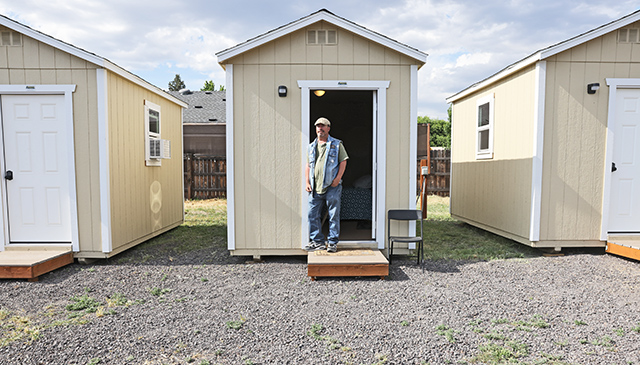Juniper Ridge revisited
Published 4:00 am Friday, February 15, 2013
With the real estate market in recovery, Bend City Manager Eric King says it’s time to reinvigorate the city’s efforts to develop Juniper Ridge.
The 1,500-acre mixed-use development on the north end of Bend is supposed to include a business park, shopping areas, hundreds of homes, parks, trails and a university. But development stalled during the recession, and only three companies have located there so far.
King said options include selling all or a portion of Juniper Ridge to a master developer, partnering with a private company or hiring a project manager to oversee the project. The city regulates development, but “the city’s traditionally not in the development business,” King said.
“Now that things are starting to recover, it’s time to start that conversation again of what that might look like,” King said. “But it’s also important the city doesn’t give up on its vision for Juniper Ridge, the vision we spent so much time and money pursuing. There are ways to structure a deal so you’re not just selling the land and giving up on the vision.”
The city previously had a public-private partnership to develop the property with master developers Juniper Ridge Partners. However, the city and Juniper Ridge Partners could not reach a formal development agreement, and in 2008, city officials agreed to pay the developers $2.5 million in return for full ownership of the project master plan and being shielded from lawsuits.
“I came in and executed the deal to sever that relationship,” King said.
King said that with new city councilors in office and improvements in the industrial real estate market, it’s time to discuss how to proceed with Juniper Ridge. The topic is one of many that will be discussed at a City Council goal-setting meeting today.
“We’ve been in somewhat of a holding pattern in the last few years because there just isn’t a market for vacant industrial land,” King said.
“Now, industrial vacancies are about 11 percent. They’re coming down, so there’s more of a market.”
Although Juniper Ridge properties are listed for sale, a project manager who could actively market the development could help the process, King said.
Bruce Kemp, principal broker and partner at Compass Commercial Real Estate Services, said industrial land prices are creeping back up. The city has seven shovel-ready industrial lots in Juniper Ridge, for a total of approximately 22 acres, listed for sale with Compass Commercial.
Prices bottomed out at $2.50 to $3 per square foot when several bank-owned industrial properties were on the market, Kemp said. But three of these distressed properties sold in 2012. “There aren’t any properties priced that inexpensively at this time,” Kemp said. “It’s probably more around (the) $4 (per square foot) range now.”
The vacancy rate for industrial properties has also declined, from above 20 percent a couple of years ago to 10 percent now, Kemp said. A normal industrial vacancy rate would be 5 percent to 8 percent, he said.
“There’s a low inventory of industrial lands left in the city, and of course much of that is in Juniper Ridge,” Kemp said. “We’re starting to get more inquiries at this point in time on that and other industrial products.”
Through the terms of a development agreement or other contract, the city can ensure that a master developer sticks to the city’s vision for Juniper Ridge, King said. There are also covenants, conditions and restrictions that determine how land in Juniper Ridge will be managed and maintained in the future.
The city has paid for work on Juniper Ridge partly with urban renewal tax revenue, which can only be used to pay for projects listed in the Juniper urban renewal plan. That plan expires 30 years after its inception, city Finance Director Sonia Andrews wrote in an email. The urban renewal plan was adopted in 2005. Deschutes County Assessor Scot Langton said that in recent years, the urban renewal tax has generated approximately $960,000 annually.
The urban renewal tax district covers properties inside Juniper Ridge and some properties west of U.S. Highway 97, King said. “The idea is the taxes generated are reinvested to benefit infrastructure in that area,” King said. “We’ve wanted to make sure the general fund, the general taxpayer, is not paying for Juniper Ridge.”
Juniper Ridge development timeline
What the city spent
The total spent on Juniper Ridge is $18.4 million, to build infrastructure, obtain land use entitlements and pay for other development costs.
“Of the total spent, $9.8 million was for ‘hard construction costs,’” Bend’s Finance Director Sonia Andrews wrote in an email. That includes $5.8 million for construction of the Cooley Road and 18th Street extensions and roundabout, and $1.8 million for power and gas lines to the area. Construction of a sewer force main and pump station cost $1.1 million, roads and paving cost $846,000 and canal piping cost $280,000, according to Andrews.
How the city paid
Bend took on $9.7 million in debt to pay for work at Juniper Ridge. Of that, $3.7 million in urban renewal debt financed a portion of the Cooley Road and 18th Street extension and roundabout, Andrews wrote. All debt issued was for construction of infrastructure. The city is repaying the debt with Juniper Ridge urban renewal taxes. The city raised $9.56 million from land sales at Juniper Ridge and used the money to pay for the master plan, obtain land use entitlements and pay for other development costs.
Source: City of Bend
2005: City officials adopt the Juniper Ridge Urban Renewal Plan.
2006: Les Schwab announces its headquarters will move from Prineville to Juniper Ridge.
September 2006: The city and Juniper Ridge Partners, which includes master developers Ray Kuratek and Jeff Holzman, sign a mostly nonbinding agreement to develop the entire site. However, the city and developers are never able to agree on a formal development contract.
October 2007: Kuratek and Holzman, of Juniper Ridge Partners, walk away when Bend Special Projects Manager Ron Garzini demands several changes to an agreement.
2007: The Oregon Department of Transportation tells the city it cannot approve more building in the area around the intersection of Cooley Road and U.S. Highway 97, which includes some of Juniper Ridge, until the city comes up with an acceptable proposal to fix traffic congestion at the intersection. (The department later allowed exceptions for the three companies that have purchased land at Juniper Ridge.)
March 2008: City officials sign a deal with master developer Juniper Ridge Partners. The city pays the developer $2.5 million in return for full ownership of the project master plan and being shielded from lawsuits. The agreement also gives Juniper Ridge Partners first option on 50 acres surrounding Les Schwab’s headquarters.
2008: Bend biotechnology company Suterra purchases land in Juniper Ridge. PacifiCorp signs a deal with the city to purchase land and build a service center and a temporary power substation at Juniper Ridge.
January 2009: The city hires Juniper Ridge Development Manager David Ditz on a contract basis.






